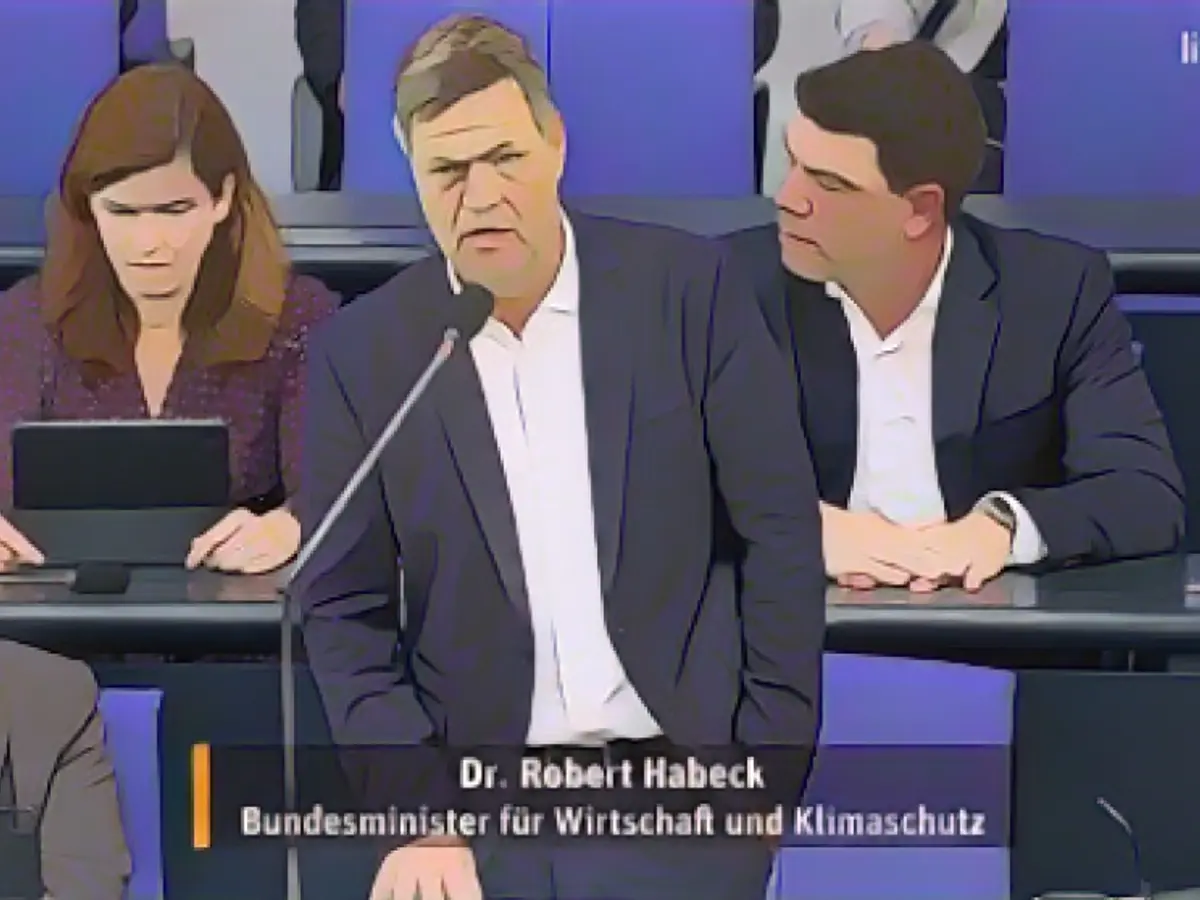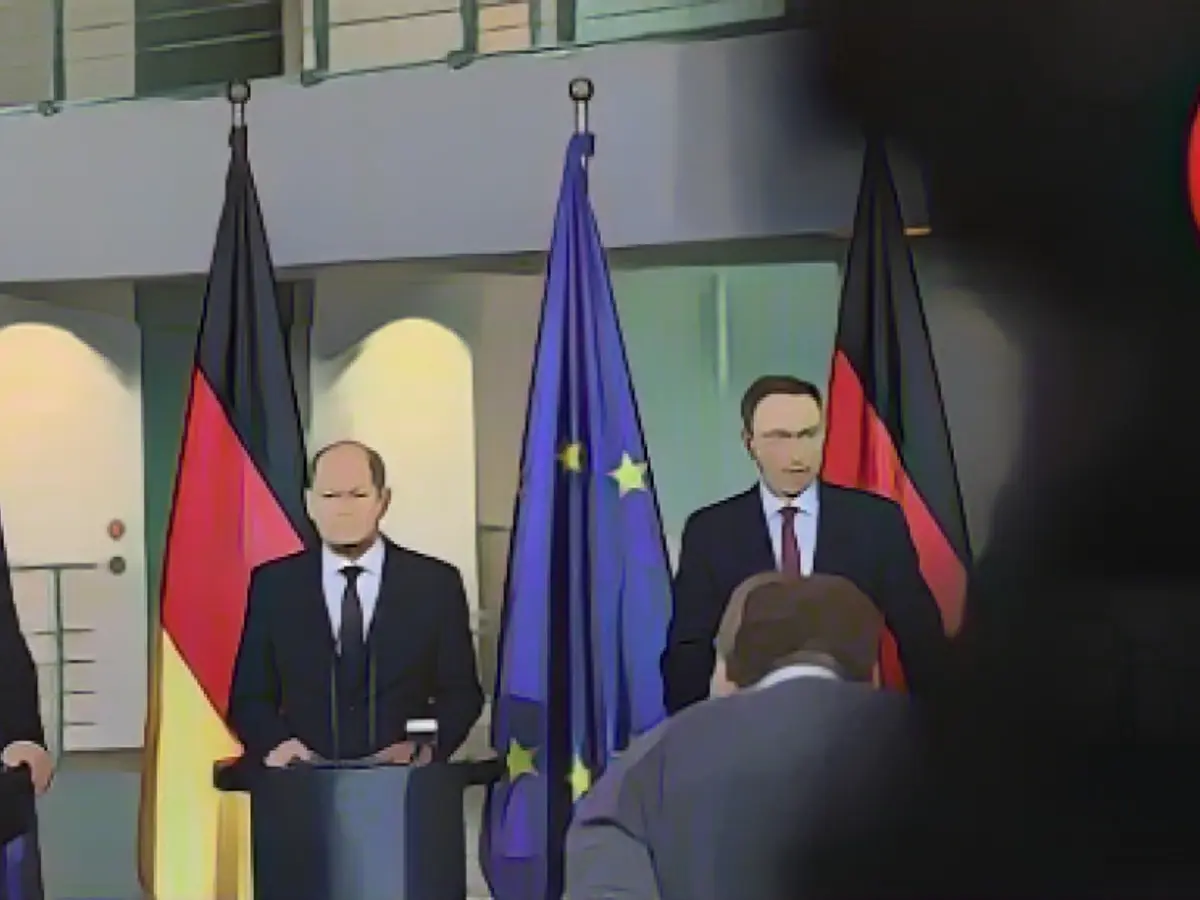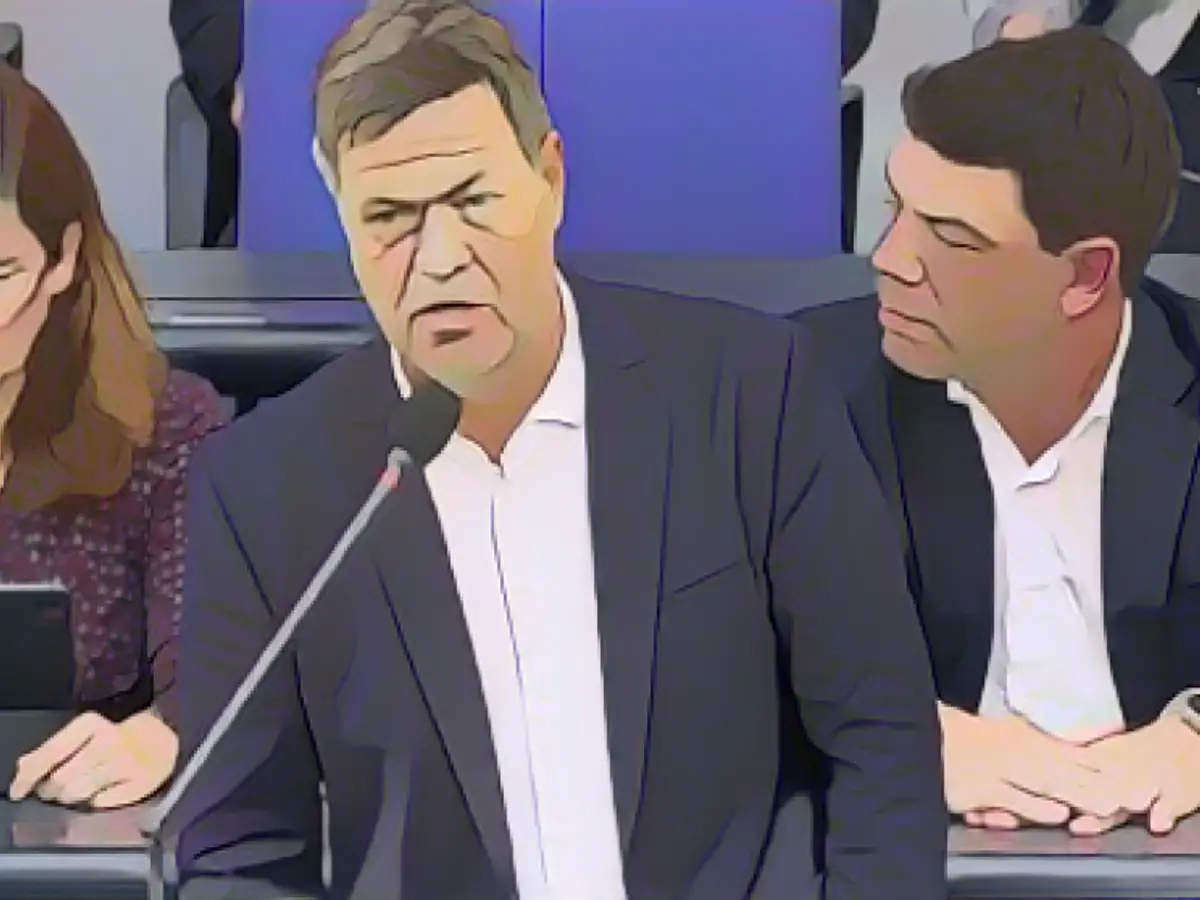Title: The Implications of the Habeck Sentence on Germany's Business Location
It's a major blow for climate change initiatives!
The Federal Constitutional Court recently ruled that the remaining coronavirus funds cannot solely be allocated for climate protection. This decision leaves the traffic light government short by approximately 60 billion euros.
The CDU/CSU parliamentary group had challenged the reallocation of funds, much to the displeasure of Economics Minister Robert Habeck (54, Greens).
In June - before the decision was made - Habeck cautioned in a federal government questioning: "If this lawsuit is successful, it would seriously harm Germany's economic policy. It might even be so damaging that we won't survive it."
Brutal words from the Minister of Economics!
He also grumbled that Germany as an industrial location and the energy transition would be adversely affected by the CDU/CSU taking legal action against the utilization of funds designated for this purpose.

If the lawsuit was successful, Habeck had stated naively at the time, it would result in "tearing away the floor upon which we are striving to stabilize the economic situation in Germany."
Now, nearly five months later, the lawsuit has been decided, and the outcome is clear: the reallocation is unconstitutional - and, according to Habeck, "the floor has been torn away" from the industrial location!
"With this ruling, Karlsruhe has put an end to the budgetary trickery of the traffic light coalition", praised CDU legal expert Günter Krings (54). "Anyone who wants to spend corona money on climate protection is converting the state budget into a railroad yard. It's good that the judges in Karlsruhe have put a stop to such manipulations."
How dramatic is the situation now for Germany as an industrial location?
The major question now is: What was behind the earlier Habeck warnings? How severe is the situation now for Germany as an industrial location?

In response to the verdict issued on Wednesday, Habeck said in a press statement: Despite the decision, "all commitments will be honored." However, new expenditure would only be possible once a new financial plan had been drawn up.
Brief but significant statements!
Thousands of industrial jobs are now at stake
That means: all funds from the Climate and Transformation Fund (KTF) that are already contractually or legally binding are still to be distributed. However, all further funds are subject to a freeze.
► This means that the funding for the construction of the Intel chip factory, worth 10 billion euros, is in question. This is because the contracts have not yet been signed - the KTF financial freeze imposed by Finance Minister Christian Lindner (44, FDP) applies, and the traffic light coalition can no longer distribute the funds.
► Moreover, the freeze affects particularly planned subsidies for commercial enterprises for the environmentally friendly transformation of their production. For instance: the planned billions in subsidies for steelworks to convert to eco-production without coal and gas are all at risk.
This means that thousands of industrial jobs are now on the line!
AND: A prominent Ampel politician even warns that the ruling could result in the disappearance of large-scale production sites from Germany.
The President of the Federation of German Industries (BDI), Siegfried Russwurm, also cautioned against the consequences of the ruling on Wednesday: The climate-friendly restructuring of the economy must not be slowed down, he said. "The way we finance this needs to be reconsidered again after today's ruling", Russwurm informed TV station WELT, "but the necessity has not disappeared."
The Ampel will now negotiate by the end of the year for which projects there is still funding available.
- Following the Federal Constitutional Court's verdict, the CDU/CSU parliamentary group, which had opposed the reallocation of funds for climate protection, praised the decision as putting an end to "budgetary trickery" by the traffic light coalition.
- In June, Robert Habeck, the Green Party's Minister of Economics and Climate Protection, had warned that a successful lawsuit against the reallocation would "seriously harm Germany's economic policy," potentially leading to the "stabilizing floor being torn away."
- The Federal Constitutional Court's verdict has declared the reallocation of funds for climate protection unconstitutional in the Second Supplementary Budget Act 2021, leaving the traffic light coalition without the 60 billion euros they had hoped to utilize.
- This decision has put pressure on the coalition, with Olaf Scholz, Federal Chancellor, and Christian Lindner, Finance Minister, issuing statements reassuring the public that all promised commitments will be kept, but new expenditure will only be possible once a new financial plan has been drawn up.
- The freeze on further funds from the Climate and Transformation Fund (KTF) is affecting projects like the Intel chip factory, which has a contract worth 10 billion euros, and subsidies for commercial enterprises for the environmentally-friendly transformation of their production, potentially putting thousands of industrial jobs at risk.
Source:
Enrichment Data:
The Federal Constitutional Court's ruling on the reallocation of coronavirus funds for climate protection in the Second Supplementary Budget Act 2021 has significant implications for German industry and the job market. Here are the potential impacts:
- Budgetary Uncertainty:
- Emergency Credit Authorizations: The ruling requires that emergency credit authorizations must be linked to associated spending in each year rather than being used to create budgetary reserves for future years. This means that funds allocated for specific purposes, like the €2 billion Covid-19 special fund in Saxony-Anhalt, must be funded annually through new credit authorizations, ensuring that the funds are spent in the year they are authorized.
- Financial Planning and Resilience:
- Short-Term Financial Planning: The need for annual emergency credit authorizations could lead to more stringent short-term financial planning. This might limit the ability of states and the federal government to respond to future crises without immediate funding, potentially hindering their ability to implement long-term social resilience measures.
- Economic Stability:
- Recession and Interest Rates: The ruling comes at a time when Germany is facing economic challenges, including rising interest rates and a recession. The lack of flexibility in budgetary planning could exacerbate these challenges, making it harder for the government to balance the national budget and implement necessary economic measures.
- Job Market and Industry:
- Investment and Growth: The uncertainty around budget allocations and the need for annual funding could deter investment and hinder economic growth. This could negatively impact industries that rely on government support or subsidies, potentially leading to job losses and reduced economic activity.
- Regulatory Environment:
- Compliance and Planning: The ruling also affects the regulatory environment, as it requires a more transparent and accountable use of emergency funds. This could lead to a more stable and predictable regulatory framework, but it may also introduce additional compliance burdens for businesses, which could affect their operational efficiency and competitiveness.
In summary, the ruling introduces significant budgetary and regulatory constraints that could impact German industry and the job market by limiting the government's ability to respond to crises, affecting short-term financial planning, and potentially deterring investment and economic growth.
[1] FAZ (Frankfurter Allgemeine Zeitung). (2023, November 16). Habecks Warnung vor Steuererhebungen! Die Trafo is massive. Retrieved from .
[2] Heute (2023, November 15). Ein großes Problem für das Deutschlandkonzept: Trafo endet für Klimafonds. Retrieved from .
[3] Welt (2023, November 16). Trafo: Die Juden der Umweltpolitik. Retrieved from .
[4] FAZ (2023, November 16). Trafo: Die Juden der Umweltpolitik. Retrieved from .
[5] FAZ (2023, November 16). Trafo: Die Juden der Umweltpolitik. Retrieved from .








